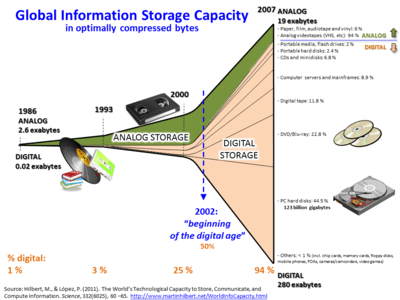Dataism
Dataism is a term that has been used to describe the mindset or philosophy created by the emerging significance of Big Data. It was first used by David Brooks in the New York Times in 2013.[1] More recently, the term has been expanded to describe what social scientist Yuval Noah Harari has called an emerging ideology or even a new form of religion, in which 'information flow' is the 'supreme value'.[2]
History
"If you asked me to describe the rising philosophy of the day, I'd say it is Data-ism", wrote David Brooks in the New York Times in February 2013.[1] Brooks argued that in a world of increasing complexity, relying on data can reduce cognitive biases and "illuminate patterns of behavior we haven't yet noticed".
In 2015, Steve Lohr's book 'Data-ism' looked at how Big Data is transforming society, using the term to describe the Big Data revolution.[3][4]
Development by Harari
In his 2016 book, Homo Deus, Yuval Noah Harari takes the idea of Dataism further, putting it into a historical context. He argues that all competing political or social structures can be seen as data processing systems: "Dataism declares that the universe consists of data flows, and the value of any phenomenon or entity is determined by its contribution to data processing"[2].

Harari posits that "we may interpret the entire human species as a single data processing system, with individual humans serving as its chips."[6] He then argues that the whole of human history can be read as a process of improving the efficiency of this system by increasing the number and variety of processors/chips (humans) in the system, increasing the number of connections between the processors and increasing the freedom of movement along existing connections. A condensed form of this argument can be read in Harari's Wired article from 2016.[7]
Harari goes on to argue that Dataism, like any other religion, has practical commandments. A Dataist should want to "maximise dataflow by connecting to more and more media"[8], and believes that freedom of information is "the greatest good of all". Harari also argues that Aaron Swartz, who took his life in 2013 after being prosecuted for releasing hundreds of thousands of scientific papers from the JSTOR archive online for free, could be called the "first martyr" of Dataism.
Writing in the Financial Times, Harari argued that Dataism presents an existential challenge to the dominant moral ideology of Humanism, which sees human feelings as the ultimate authority in the world: "humanism is now facing an existential challenge and the idea of “free will” is under threat... Once Big Data systems know me better than I know myself, authority will shift from humans to algorithms."[9] Harari predicts that the logical conclusion of this process is that eventually humans will give algorithms the authority to make the most important decisions in their lives, such as who to marry and which career to pursue.
Criticism
Commenting on Harari's characterisation of Dataism, security analyst Daniel Miessler believes that Dataism does not present the challenge to the ideology of liberal humanism that Harari claims, because humans will simultaneously be able to believe in their own importance and that of data.[10]
Harari himself raises some criticisms, such as the problem of consciousness, which Dataism is unlikely to illuminate. Humans may also find out that organisms are not algorithms, he suggests.[11]
Other analysts such as Terry Ortleib have looked at the extent to which Dataism poses a dystopian threat to humanity.[12]
See also
References
- 1 2 Brooks, David (2013-02-04). "Opinion | The Philosophy of Data". The New York Times. ISSN 0362-4331. Retrieved 2018-01-05.
- 1 2 Harari, Yuval Noah (2017). Homo Deus: A Brief History of Tomorrow. UK: Vintage Penguin Random House. p. 428. ISBN 9781784703936.
- ↑ Igo, Sarah E. (2015-03-20). "You can run from Big Data, but can you hide?". Washington Post. ISSN 0190-8286. Retrieved 2018-01-05.
- ↑ Lohr, Steve (May 2015). Data-ism : The Revolution Transforming Decision Making, Consumer Behavior, and Almost Everything Else (First ed.). New York, NY: HarperBusiness. ISBN 0062226819. OCLC 861210012.
- ↑ Harari, Yuval Noah (2017). Homo Deus: A Brief History of Tomorrow. UK: Vintage. p. 429. ISBN 9781784703936. OCLC 953597984.
- ↑ Harari, Yuval Noah (2017). Homo Deus: A Brief History of Tomorrow. UK: Vintage, Penguin Random House. p. 440. ISBN 9781784703936.
- ↑ Harari, Yuval. "'Homo sapiens is an obsolete algorithm': Yuval Noah Harari on how data could eat the world". Retrieved 2018-01-05.
- ↑ Harari, Yuval Noah (2017). Homo Deus: A Brief History of Tomorrow. UK: Vintage Penguin Random House. p. 445. ISBN 9781784703936.
- ↑ Harari, Yuval Noah (2016-08-26). "Yuval Noah Harari on big data, Google and the end of free will". Financial Times. Retrieved 2018-01-05.
- ↑ "Some Thoughts on Dataism". Daniel Miessler. 2017-04-07. Retrieved 2018-01-05.
- ↑ "From Humanism to Dataism. A future scenario. - Dataethical Thinkdotank". Dataethical Thinkdotank. 2017-04-25. Retrieved 2018-01-05.
- ↑ Terry Ortlieb (2017-03-07), is Harari Dataism Dystopian, retrieved 2018-01-05